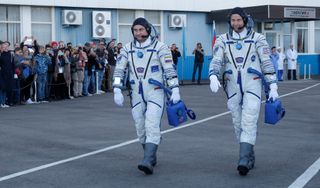Crew of Failed Soyuz Rocket Will Fly Again Next Spring, Russia's Space Chief Says
One day after a Soyuz rocket failed just after liftoff, sending its two-man crew on a dramatic abort in midflight, the head of Russia's space agency Roscosmos said the American and Russian aboard the flight will fly again next year.
Dmitry Rogozin, head of Roscosmos, said via Twitter on Friday (Oct. 12) that Russian cosmonaut Alexey Ovchinin and NASA astronaut Nick Hague will fly again in the spring, according to a translation. The statement suggests Rogozin has strong confidence that an investigation into the Soyuz launch failure will swiftly find a root cause. NASA's own administrator, Jim Bridenstine, was also optimistic on a swift resolution.
"I fully anticipate that NASA astronauts will fly again on the Soyuz spacecraft,"' Bridenstine said via Twitter Sunday (Oct. 14) after a news conference in Moscow. [In Photos: Space Crew's Harrowing Soyuz Launch Abort]

A Soyuz rocket carrying Hague and Ovchinin launched skyward from Baikonur Cosmodrome in Kazakhstan on Thursday (Oct. 11) on a mission to the International Space Station, where the two space travelers were to join three other crewmembers already living aboard the orbiting lab. But about 119 seconds after liftoff, something went wrong.
The crew's Soyuz MS-10 capsule abort system deployed, ripping the space capsule from its booster and pulling Hague and Ovchinin to safety. After subjecting the crew to G forces of up to 6.7 times the force of gravity, the capsule landed safely under its parachute, with search-and-rescue teams swiftly recovering the crew. An investigation into the Soyuz rocket failure is underway, with an early focus on the four strap-on boosters used early in flight.
Famed cosmonaut Sergei Krikalev, director of human spaceflight for Roscosmos, told reporters Friday that it appears one of those boosters did not separate cleanly, nicking the Soyuz's core first stage, according to SpaceNews.
Hague and Ovchinin are in good health and rejoined their families at Star City in Russia, where Roscosmos trains cosmonauts and astronauts for spaceflight, according to Rogozin. Photos of the men show them undergoing medical checks, embracing family members after an emotional reunion and speaking with NASA and Roscosmos officials.
Get the Space.com Newsletter
Breaking space news, the latest updates on rocket launches, skywatching events and more!
Roscosmos officials said Saturday (Oct. 13) that telemetry data and video recordings have been sent to the Soyuz manufacturer RSC Energia for review. Recovery teams have also recovered debris from every stage of the Soyuz rocket from the remote Kazakh steppes around Baikonur Cosmodrome so that they can be studied in more detail. Those rocket components should also be delivered Sunday (Oct. 14).
Krikalev told reporters Friday that Roscosmos officials are aiming to have an update on the Soyuz abort investigation by this Saturday (Oct. 20).
Russia's crewed Soyuz spacecraft are currently the only vehicles available to fly NASA astronauts to and from the International Space Station. NASA has contracts with two private American companies — SpaceX and Boeing — to fly Americans into space on commercial spacecraft, but those new vehicles are not expected to begin test flights until next year, agency officials have said.
Email Tariq Malik at tmalik@space.com or follow him @tariqjmalik. Follow us @Spacedotcom and Facebook. Original article on Space.com.
Join our Space Forums to keep talking space on the latest missions, night sky and more! And if you have a news tip, correction or comment, let us know at: community@space.com.

Tariq is the Editor-in-Chief of Space.com and joined the team in 2001, first as an intern and staff writer, and later as an editor. He covers human spaceflight, exploration and space science, as well as skywatching and entertainment. He became Space.com's Managing Editor in 2009 and Editor-in-Chief in 2019. Before joining Space.com, Tariq was a staff reporter for The Los Angeles Times covering education and city beats in La Habra, Fullerton and Huntington Beach. In October 2022, Tariq received the Harry Kolcum Award for excellence in space reporting from the National Space Club Florida Committee. He is also an Eagle Scout (yes, he has the Space Exploration merit badge) and went to Space Camp four times as a kid and a fifth time as an adult. He has journalism degrees from the University of Southern California and New York University. You can find Tariq at Space.com and as the co-host to the This Week In Space podcast with space historian Rod Pyle on the TWiT network. To see his latest project, you can follow Tariq on Twitter @tariqjmalik.
Most Popular


